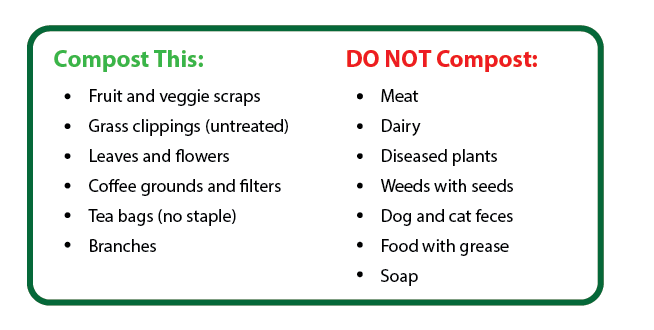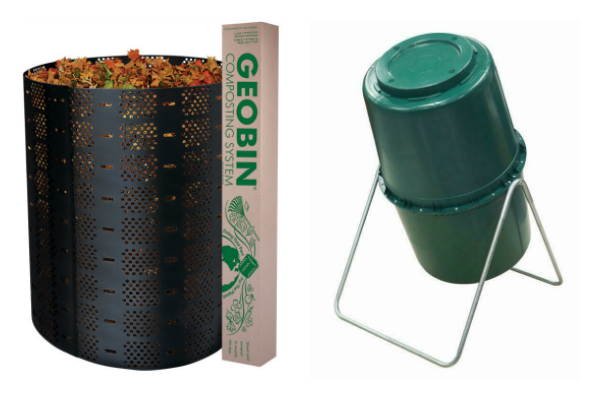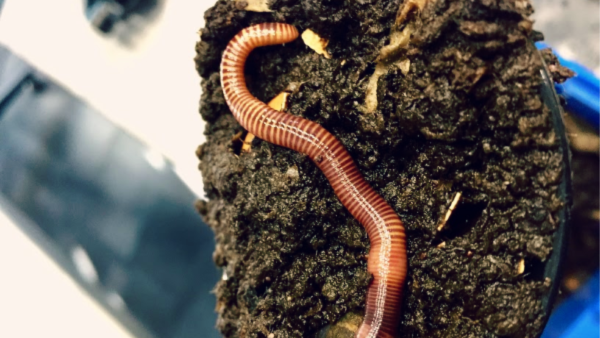May 01, 2020

During the pandemic, we are all spending more time at home and beginning to examine our daily habits. We are looking to make the most of the resources we have; cooking more and sorting through our accumulated belongings. You may be spending more time in your backyard and are contemplating a vegetable garden. If you’re not already composting at home, now is the perfect time to consider starting!
Composting isn’t just for radical tree-huggers and is easier than you may think! Take a walk in the woods, and you’ll see that nature transforms fallen leaves into rich humus on the forest floor without any help from us. Compost is a natural process, all you need to do is learn how composting works so that you can do it successfully at home.
Benefits of Backyard Composting
- Reduction in trash weight and volume
- Soil enrichment
- Slow release of nutrients in soil
- Increases plant's disease resistance
- Encourage beneficial fungi and bacteria
- Less money spent on water, fertilizer and pesticides
If you’ve been spending more time in the kitchen, you may have noticed; we generate a lot of food waste. In fact, in the United States, food waste is the single largest component of municipal waste. Backyard composting offers a beneficial way to recycle a good portion of that food. Instead of throwing it in the trash, you can use it, along with leaves and grass to prepare nutrient-rich organic soil amendment for your houseplants or garden by composting at home.
Making use of the organic material that would normally be thrown away helps the environment by reducing the amount of waste that is transported and sent to the landfill. Creating and using compost in your garden reduces the need for chemical fertilizers to feed your plants and also helps our sandy soils retain water.
What to Compost

Fruit and vegetable scraps, untreated grass clippings, leaves, flowers, coffee grounds and filters, tea bags without staples and branches can all be composted. Keeping meat, dairy, oils and grease out helps keep critters away. Your backyard compost will not get as hot as a commercial operation, so weed seeds and possible pathogens from pet waste will not be obliterated. Keep them out.
Tips for Success
Water: Generally, food scraps have a pretty high water content and you shouldn’t need to water your compost. Most bins you can purchase have lids with openings to allow rainwater to infiltrate.
Balancing “Greens and Browns”: Your kitchen scraps are the nitrogen rich “greens.” You’ll need to add carbon rich “browns” too. As you are tidying up your yard, chop up leaves with a lawn mower and you’ll have the perfect material to mix in whenever you add food scraps. You can get geeky with carbon/nitrogen ratios, but you don’t need to. Add “browns” to cover scraps and prevent odors.
Temperature: Warm temps come from all the microorganisms working to break down the organic matter in your bin. A “hot” pile will be ready faster, but if you don’t feel a lot of warmth from your bin, don’t worry, be patient.
Size: Commercial bins are built to maintain heat and moisture. If you’re building your own bin, a minimum size of 3’ x 3’ x 3’ is recommended.
Aeration: Turning your pile increases oxygen flow and speeds up the process. Do it often if you can, but remember that no one is turning the leaves on the forest floor and they’re still breaking down!
Choosing a Compost Bin or Container
There are so many options! Choose what you think will work best for you. ACUA is currently hosting an online compost bin sale to help make getting started easier. Check out the options, including the tried and true Earth Machine, the GeoBin open top container or an off-the-ground compost tumbler. There are additional tools available too. Pre-order now through June 9 for June 13 delivery at ACUA’s Environmental Park in Egg Harbor Township.

Left: GeoBin open top container. Right: Off-the-Ground Compost Tumbler
If you’re looking to save money, old pallets, animal fencing or even an old trash can with holes drilled in it can quickly become a cheap and easy solution.
Indoor Composting
Not having a backyard doesn’t mean you can’t compost at home! You can make a worm bin and have red wigglers take care of your veggie scraps. These compost champs can eat up to half their body weight in fruit and vegetable scraps every day. Building their home is inexpensive, easy, and fun! Learn how to build your own worm bin.

There’s a lot more you can learn about composting, and we’ve included more resources here. Please know that you don’t have to be an expert to get started. You don’t need to spend a lot of money, or put in a lot of time or effort to be successful. Give it a try – now is the perfect time to get started!